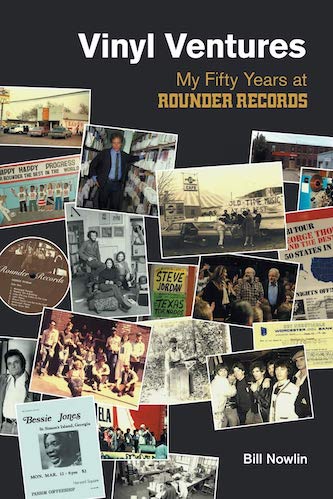Book Interview: Bill Nowlin on the Little Label That Could — Fifty Years at Rounder Records
By Jason M. Rubin
For local music enthusiasts of all stripes, the hometown label was a point of pride; for musicians and fans the world over, Rounder was the go-to source for music you couldn’t readily find elsewhere.

Bill Nowlin — “We put out music we wanted to hear.”
From its founding in 1970 by Bill Nowlin, Ken Irwin, and Marian Leighton Levy, to its sale half a century later to the Concord Music Group, Rounder Records was instrumental in documenting and promoting often-underexplored and underappreciated music in a range of genres. These include roots music, Americana, bluegrass, folk, blues, and country, as well as music from around the world. Having been based at various times in Somerville and Cambridge, Rounder was the little label that could, demonstrating impressive taste in talent and integrity in how they did business. For local music enthusiasts of all stripes, the hometown label was a point of pride; for musicians and fans the world over, Rounder was the go-to source for music you couldn’t readily find elsewhere.
Nowlin has just released a memoir of his Rounder days, Vinyl Ventures: My Fifty Years at Rounder Records (Equinox Publishing, 334 page,$29.95). But it’s more than a memoir. It’s a history, not only of the label but of the times. It’s a scrapbook (I swear, Nowlin has saved every invoice, letter, canceled check, and memo that has ever crossed his desk), packed with interesting anecdotes and color photos of people, places, and album covers gone by. It’s also a bit of a love letter to the fans and the record-buyers — those for whom discovering and enjoying music is more important than a lot of other things. More than anything, it is a highly detailed look at the ups and downs of running a business when none of the founders has any business education, when handshakes counted for something, and when “labor of love” doesn’t even come close to describing the round-the-clock work that went into making Rounder a success.
(To make the musical immersion as complete as possible, the e-book version of Vinyl Ventures has links to a Spotify page where you can hear some of the music Nowlin discusses.)
Over the course of its 50 years in the founding trio’s hands, Rounder produced more than 3,000 albums and won 56 Grammys, an amazing achievement considering they started with only $1,000 of capital and a lot of chutzpah. With that money they were able to produce their first two albums in October 1970. None of the founders took a salary for the first four years. When, in 1971, it was time to incorporate, they made Levy the president simply because there were so few female label heads in the industry. The three founders all lived together, and Irwin and Levy were in a relationship. They considered Rounder to be more of a collective than a company. “These were hippie days,” Nowlin notes drily.
His co-founders clearly agreed. According to Irwin, “We got into the music business because of the music and the artists. When we started out, we weren’t even thinking of making a living.” Levy adds, “There was no real danger of seduction by the commercial mainstream because none of us was all that interested. There’s nothing self-righteous about it. That’s just not who we are.”
In spite of that, they did see commercial success. In 1977, they put out the first of several albums by George Thorogood and the Destroyers. They earned their first Grammy in 1981 with an album by Clarence Gatemouth Brown. In 1984, they hit the one-million mark in annual album sales. In 1986, they signed fourteen-year-old Alison Krauss and released her debut album the following year. Krauss, who stayed loyal to Rounder for 30 years, now holds the record for most Grammys by any female artist.
While proud of everything he and Rounder accomplished, Nowlin gives scant space to his relationship with Mimi Fariña (“The romance lasted about a year and then faded.”) and does little to pat the label on the back for putting up money to help struggling folk club Passim pay off its debts in 1996. When the founders sold Rounder in 2010, it wasn’t because they had to, it just seemed like the right time and the right partner. A 50th-annversary celebration was planned for October 2020, but was canceled because of the pandemic.
I spoke with Nowlin about the long, strange trip he and his friends were on for so many years.
 Arts Fuse: You call your career “a hobby that got out of control.” How different do you think it would have been had you all been business majors and had more of a bottom line attitude toward the business?
Arts Fuse: You call your career “a hobby that got out of control.” How different do you think it would have been had you all been business majors and had more of a bottom line attitude toward the business?
Bill Nowlin: I’m not sure we would have started a business in the first place. It really was a hobby. We put out music we wanted to hear. That we had success was an unexpected surprise. I was working full-time as a professor back then, so putting all my eggs in one basket and going into business was not in my plans.
AF: When you think of roots music, Americana, bluegrass, you don’t think of Greater Boston. Was there a real subculture of enthusiasts you tapped into here, or did you feel like fish out of water digging old-time fiddle music in this area?
Nowlin: Actually, Boston and Cambridge was a good place for this music. There were a few islands around the country like New York City, Ann Arbor, Los Angeles. All these places had at least one club putting on music of one kind of another that we enjoyed.
AF: Almost from the get-go, you determined that distribution of other labels was going to be a key part of the business, rather than just selling your own releases. In retrospect, that seems like an inspired decision.
Nowlin: When we started trying to get record stores to buy our first two records, we were asked who our distributor was, because they wanted to buy from a distributor. So we decided to be our own distributor. We knew there were other small labels because we modeled ourselves on them, so we went to them and said if you let us distribute your records we’ll all do well. As it turned out, the income we got from distributing became an important source of sustenance when we weren’t doing so well as a label.
AF: You ran an ethical, progressive business in an industry not generally known for those qualities. How hard was it to maintain your values over the years?
Nowlin: We learned the business as we went along. But I don’t think there’s too many record companies that are unethical. Some didn’t pay royalties as high as we did but, as our overhead increased, we had to come more in line with industry realities. We formed a trade organization with other small independent labels and we all got along. We saw the bigger companies as the opposition but not the enemy. But I think the way we ran the business helped us build loyalty with our artists.
AF: I imagine the nice thing about having three founders is that there were no tie votes. But what were some of the things you three butted heads about?
Nowlin: We didn’t vote on anything. We knew that the whole was greater than the sum of our parts, and if we started having votes, there would be a loser as well as a winner. If someone wanted to put out an album, even if the other two weren’t in favor of it, we would go along with it for the sake of cohesion. Somehow the dynamic seemed to work among us. Ken and Marian dated for a while, then broke up; that could have been a problem but they put the company first.
AF: What are some of your favorite Rounder releases?
Nowlin: It changes from time to time, but some of the albums that I liked the most were the first JD Crowe & the New South album (Rounder 0044, 1975); Buzz Busby & Leon Morris, Honky Tonk Bluegrass (Rounder 0031, 1974); and an album by the Po’ Ramblin’ Boys called Toils, Tears & Trouble that we brought to Concord in 2019 after we’d sold the business. I’m particularly proud of an album we put out called Radio Freedom: Voice of the African National Congress and the People’s Army Umkhonto We Sizwe (Rounder 4019, 1985). Back in the day, if you were caught listening to the station that aired these ANC propaganda songs in South Africa, you could be put in jail.
AF: What’s next for you?
Nowlin: I’ve managed to stay very busy. I write a lot of books and articles on baseball for SABR (Society for American Baseball Research) and have three books at the designer right now. Overall, I’ve edited or written 100 books at this point. Sometimes I think I should take it easy, but I can’t just relax and do nothing.
Jason M. Rubin has been a professional writer for more than 35 years, the last 20 as senior creative associate at Libretto Inc., a Boston-based strategic communications agency where he has won awards for his copywriting. He has written for Arts Fuse since 2012. Jason’s first novel, The Grave & The Gay, based on a 17th-centusy English folk ballad, was published in September 2012. His current book, Ancient Tales Newly Told, released in March 2019, includes an updated version of his first novel along with a new work of historical fiction, King of Kings, about King Solomon and the Queen of Sheba. Jason is a member of the New England Indie Authors Collective and holds a BA in Journalism from the University of Massachusetts Amherst.
Tagged: Bill Nowlin, Concord-Music-Group, Jason M. Rubin, Rounder Records, Vinyl Ventures

